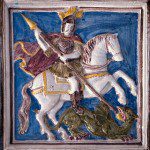I recently came upon an article titled What Buddhism Learned from Christianity, by Marvin Olasky, editor of World Magazine. World Magazine covers national and international news from a distinctly evangelical perspective; I grew up reading the magazine. Intrigued, I perused Olasky’s article and was struck by this paragraph:
We also need to learn more about movement the other way: What from Eastern religions found its way into pseudo-gospels such as the Gospel of Thomas? Did monasticism and doctrines concerning purgatory, indulgences, and the efficacy of saintly merit come to Christianity from the East? Take my suppositions and run with them, please.
There is so much going on here.
In its development, Christianity was dramatically influenced by other religions. Beyond Judaism, Zoroastrianism, which originated in Iran, may have had the most significant influence on the new religion. Many scholars believe that Christianity obtained its extreme good and evil dichotomy from Zoroastrianism, for example. But of course, Olasky can’t accept that. For Olasky, Christianity is only founded on the unchanging Word of God.
In this brief paragraph, Olasky demonstrates not only his unwillingness to accept that his own beliefs include aspects of eastern religions but also his anti-Catholicism. He suggests that Catholic practices—which he does not believe are based on God’s Word—may have come from eastern religions, all the while denying (both to himself and to his audience) that any evangelical practices could have come from other traditions.
One of the most fascinating things I did when I began sorting through my parents’ beliefs for myself was read a collection of scholarly books about early Christianity. In addition to this, I read through a broad collection of writings by early Christians leaders and writers. It became clear to me that every religion, including Christianity, has changed over time, adapting to the time, confronting and being molded by new ideas, and being influenced by other religions.
Olasky has decades of experience as the editor of a premier evangelical publication. I suspect that he, too, could learn a lot by reading the books I did. Perhaps if he read them, his last paragraph would look slightly different. But then, it’s possible that he’s already read them, or others like them, and has de facto rejected the idea that eastern religions could have fundamentally influenced the early development of Christianity in ways that continue to affect his beliefs and practices today.
Being open to material that challenges your beliefs is difficult, but important.
I have a Patreon! Please support my writing!















